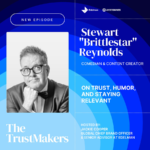By Elizabeth D’Arcy-Potts, Managing Director – Commercial, EMEA & APJ, Pipeline360
UK businesses will be watching the Autumn Budget at the end of next month with apprehension. More tax rises appear likely, which could further sap growth and consumer confidence. And the cost of borrowing remains worryingly high, as do corporate wage bills. It’s no surprise that economic uncertainty is the primary concern of half (47%) of UK B2B marketers, more than any other region, according to our research.
To cope with the inevitable impact this has on operations, B2B marketers must ruthlessly refocus their efforts on what matters. No more vanity metrics. It’s all about going back to basics to demonstrate ROI and drive revenue.
Feeling the pinch
UK PLC has had a torrid few years. First came the pandemic, which disrupted supply chains and hit service-based businesses hard. Then followed a period of rising energy bills, surging inflation, and high interest rates. Those pressures persist today alongside geopolitical instability and trade tensions.
These broader economic issues clearly impact B2B marketers. Just 40% told Pipeline360 that budgets are growing this year, while 36% claim to have resource challenges—the most of any region. Headcount may suffer as a result. Globally, 61% or respondents told us their organisations are reducing headcount or holding steady.
The second impact is on B2B buyers. Over three-quarters of UK marketers we spoke to cite longer sales cycles, more than any of their global peers. Buyer groups are also expanding, often with finance stakeholders entering the process late on. They have the power to halt or even cancel deals before they’ve even got off the ground.
The end result is sales cycles that may extend to six months or even longer, with prospects remaining in-funnel for extended periods. That poses challenges for engagement, lead nurture, and even sales-marketing alignment.
What high performers are doing
To overcome these hurdles, it pays to look at what high-performing teams are doing. Our global research points to several trends.
First, leading B2B marketers are focused on ROI and revenue, valuing measurable results more than anything else. We found high performers track more KPIs overall—the better to understand what’s working and what isn’t. And they’re more likely to track revenue-generated, engagement, marketing-sourced pipeline and MQLs, among other metrics. With budgets under scrutiny, KPIs like these help teams devote resources to the right areas.
High performers also consistently reach and engage their target audience in greater numbers (72%) than low performers (15%). This is getting harder as buying groups expand, but it’s not impossible. A data-driven approach to persona development and audience segmentation is key. AI can help here, by streamlining lead scoring and enabling seamless content personalisation at scale.
In doing so, intelligent algorithms also help with lead nurture—a capability only 13% of UK marketers rate as “excellent”. Among the areas they feel would improve nurture the most is engagement tracking. Over half (53%) cite this challenge, more than marketers elsewhere. With deeper insight into buyer intent, teams can improve campaign performance and measure success more accurately. That will come in handy when it’s time to ask for more budget.
Finally, high performers are more likely to say their sales and marketing teams are mostly or fully aligned—which in turn means less bottom-of-funnel friction and fewer drop offs. Others can join them by creating regular feedback loops, collaborative processes, and shared ownership of revenue-impact metrics with their sales colleagues. Just 37% of UK marketers use sales team insights to improve performance, for example. This needs to change.
Focus on results
Leading marketers are also more likely to streamline their tech stacks (72% vs 12% of low performers). This approach can help to reduce software licensing costs by eliminating underused tools, and ensure any new purchases are aligned with business outcomes. But there’s room to be more radical still.
Our research reveals that 81% of high performers value delivered services over tools. Rather than adding more martech solutions to an already bloated stack, they are outsourcing the entire demand gen process to a trusted third party (like Pipeline-360). That’s the way to cut complexity and free up in-house teams to focus on strategy rather than execution. It means paying for measurable outcomes now rather than the promise of pipeline and revenue at some undefined point in the future.
For UK marketers, success in uncertain times comes down to clarity: know your audience, measure what matters, and align every action to revenue.











